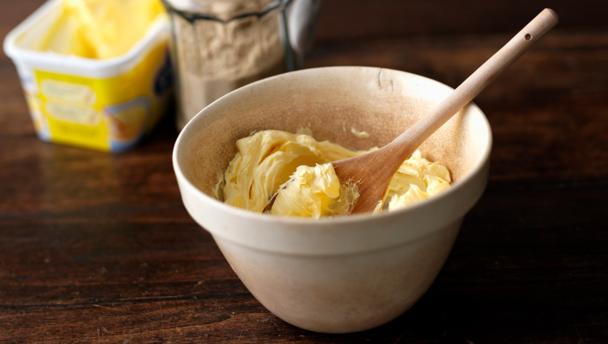

Margarine was invented in the 1860s by a French chemist as a cheap replacement for butter. Nowadays, margarine is frequently bought in the belief that it is a healthier option than butter. All margarine contains as much fat as butter, but some are lower in cholesterol and saturated fats. However the health benefits of many of these types of spreads has been called into question as most of them are made with hydrogenated (chemically hardened) vegetable oils and this process is believed to convert the polyunsaturated fat into trans-fats which have a negative effect on cholesterol and are now thought to be linked with heart disease even more than saturated fat.
 Poached salmon with lemon sauce
Poached salmon with lemon sauce
 Meat and potato pie
Meat and potato pie
 Classic Cornish pasty
Classic Cornish pasty
 Chestnut, leek and mushroom tartlets
Chestnut, leek and mushroom tartlets
 'Guilt-free gourmet' sticky toffee pudding
'Guilt-free gourmet' sticky toffee pudding
 Date parcels stuffed with frangipane and pomegranate
Date parcels stuffed with frangipane and pomegranate
 Peanut butter cookies with banana ice cream
Peanut butter cookies with banana ice cream
 Zesty tofu cheesecake
Zesty tofu cheesecake
 Proper apple pie
Proper apple pie
 Victoria sponge
Victoria sponge
 Eccles cakes
Eccles cakes
 Fairy cakes
Fairy cakes
 Vanilla cupcakes
Vanilla cupcakes
Margarine is a highly processed food made by combining water and vegetable oils and usually containing emulsifiers, preservatives, additives, artificial colourings and flavourings and salt. There are many types available using different fats and with differing flavours and uses. Some are purely vegetable-based, containing no animal products at all, and are labelled dairy-free or vegan. Others contain a mixture of animal and vegetable fats.
Margarine can be used as a substitute for butter in most cases. However, some are designed for spreading, and others are hard and designed for baking so always read the packaging before cooking with margarine.
Type the ingredients you want to use, then click Go. For better results you can use quotation marks around phrases (e.g. "chicken breast"). Alternatively you can search by chef, programme, cuisine, diet, or dish (e.g. Lasagne).